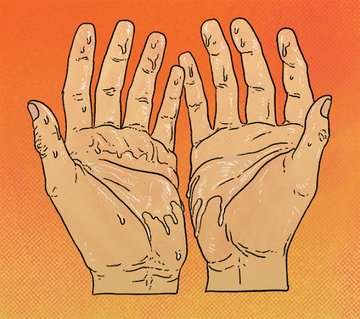Almost every sufferer of hyperhidrosis has asked if the day will come when their symptoms will disappear. You too probably dream of a time when your palms will stay dry and your shirts free from sweat stains. The short answer to this question is: “it depends.” This post will take a look at scientific findings and anecdotal evidence of hyperhidrosis prognoses, and how that may influence how sufferers should manage it.
The Truth About Hyperhidrosis Prognosis
Left alone hyperhidrosis, usually won’t disappear with age. According to one study, 88% of the participants acknowledged that their hyperhidrosis stayed the same or even got worse as time progressed. Also, primary hyperhidrosis, which is believed to be caused by an overactive nervous system, doesn't respond to seasonal changes. Up to 65% of patients treated by SweatHelp.org revealed that their sweating bothers them year-round, not just in the summertime. It's safe to conclude that hyperhidrosis generally is a long-standing condition.
However, it’s important to emphasize one key point here: a sufferer’s condition gets worse if it is left untreated or unmanaged. Even severe cases of hyperhidrosis can respond to treatment - it might just take more effort and trial and error.
How Hyperhidrosis Affects Individuals
Since the exact cause of primary hyperhidrosis remains a mystery, determining patient outcomes is a challenge for doctors. But you can be confident that the right treatment will offer you some relief. The following examples may put this into perspective.
“By the time I was 13, I gave up drawing because I was always smearing the paper. At 15, I cried because I couldn't go to a sleepover party because then people would find out about my problem. I stopped hanging out with my friends. I'd just go to school, come home, do my homework, and go to bed. I didn't want to stay cooped up, but I didn't see any other way. I finally got my mom to listen to me and take me to talk to a dermatologist. Now I get two different kinds of treatment for my sweating and it's like a miracle. I get Botox for my underarms and I do iontophoresis for my hands and feet” - Frances
“When kids found out, they tried to make me do high-fives so they could see how sweaty I was and make fun of me. I dreaded school. It was hard to talk about my problem - with my parents and with the doctors - but now thanks to the International Hyperhidrosis Society I get treated for my hyperhidrosis. I can't believe I was ever scared. But I was and I think it was because I felt so alone. But now, life is good and I'm getting A's in class like I always should have. I hope to give back and help find a cure to hyperhidrosis so no kid has to suffer like I did.” - Jerome
As you can see from both examples, the sufferers and endured some hardships throughout their youth due to excessive sweating. In neither case did hyperhidrosis resolve itself. However, with treatment and support, they were able to find relief. The takeaway is this: if you have hyperhidrosis don't sit back and wait for it to disappear. Follow the examples of Jerome and Francis and seek help.
Your Hyperhidrosis Can Fade to the Background
The right treatment and management protocols can make hyperhidrosis seem almost non-existent in your life. If you haven't already taken action to reduce excessive sweating, you can start with a few simple measures to keep it under control.
First Line of Treatment
- Wear Sweat Resistant Clothing - The right sweat-resistant clothing will keep you dry and eliminate uncomfortable sensations triggered by excessive sweating. It will also reduce sweat stains. Sweatproof shirts can go underneath other layers of clothing to prevent them from getting soaked. This alone can do wonders for your comfort and confidence.
- Use Antiperspirant - If you speak with your doctor about treatment, the first option they would likely recommend is a prescription-strength antiperspirant. For many sufferers, this antiperspirant is enough to reduce armpit sweating significantly.
- Avoid Triggers that Increase Sweating - It's true that hyperhidrosis can occur “randomly” and unprovoked, but it doesn't hurt to avoid things that increase sweating. They include the overconsumption of spicy foods, caffeine, and alcohol. Apart from your diet, take steps to reduce stress. Also, speak to your doctor about other medications that may cause excessive sweating as a side effect. He or she may change the dose.
Many of you might not require additional solutions. If you do, your doctor may recommend medications that have shown some efficacy in resolving excessive sweating. A very severe case may warrant botox injections or a procedure such as iontophoresis. No matter what is recommended don't give up. You will eventually find the right combination or the right solution to help you win the fight against excessive sweating.
Hyperhidrosis Does “Go Away” - With a Little Effort
While it's unlikely for you to simply outgrow hyperhidrosis, making an effort to manage it can make it a lot less noticeable. For many sufferers, simply not being aware of it is enough to give them the confidence to carry out their daily lives without being self-conscious about it.
Give yourself a chance to experience this. Speak to your doctor about treatment. Also, take practical steps such as wearing sweat-resistant clothing and using antiperspirant if needed. You may soon realize that excessive sweating doesn't have to keep you back at all.








